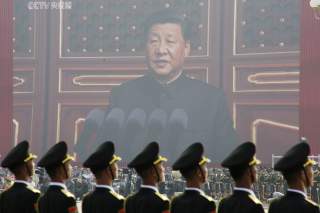Is China Totalitarian?
Has China become more liberal with the passing of the years? Has it demonstrated a willingness to respect the political and human rights widely honored by the world community?
Socialism with Chinese characteristics is not soft democratic capitalism but hard market socialism in which critical decisions are made by the Communist Party not the market. China’s economic growth is due to several factors, including its very loose adherence to the rules it agreed to abide by when it joined the World Trade Organization; the remarkable work habits of the Chinese; the allure of the 1.4 billion Chinese as a market to the Western businessman; and the ability of the Communist Party, so far, to balance the demands of a mixed economy.
As we can see, China is already totalitarian in five of the six traits developed by Brzezinski to determine a totalitarian regime. Only with regard to a centrally controlled economy do we find an authoritarian rather than a strict totalitarian structure. Human Rights Watch has been persuaded by this capitalist tilt to describe China as “a one-party authoritarian state that systemically curbs fundamental rights.” )The U.S. State Department says that “the People’s Republic of China (PRC) is an authoritarian state in which the Chinese Communist Party (CCP) is the paramount authority.”
But there is no sign that Communist China is becoming more liberal in its ideology, one-party politics, control of the military, censorship of mass communications, use of secret police, and suppression of speech and religion. By any reasonable measure, the PRC is becoming a totalitarian state whose actions are dictated and determined by Xi Jinping and the Communist Party he heads.
To say otherwise is to ignore the totalitarian behavior of Communist China for the past four decades and to doubt that a despot like Xi will do whatever is necessary to maintain his power and control.
Does this mean that the U.S. should not do business with China? No, it means that the U.S. in its trade and other dealings with the PRC should proceed from the understanding that China is ruled by a regime that is not liberal or socialist or authoritarian but totalitarian in its essence and is headed back to its Maoist roots.
We can draw a lesson from President Ronald Reagan, a lifelong anti-communist, who sat down with Soviet leader Mikhail Gorbachev once he could negotiate from a position of economic and military strength. It is clear that President Donald Trump has done his homework: he has no illusions about Communist China. He is confident he can make China keep its word to increase its purchase of U.S. products and to stop the theft of U.S. intellectual property.
If not, the president will once again apply sweeping tariffs to a wide variety of Chinese goods. And while tariffs on Chinese imports are bad for Americans, they are a brand of Trumpian-style diplomacy that a dictator like Xi Jinping understands very well.
Lee Edwards, Ph.D., is the Distinguished Fellow in Conservative Thought in the B. Kenneth Simon Center for Principles and Politics at The Heritage Foundation (heritage.org). His many books include biographies of Ronald Reagan, Barry Goldwater and William F. Buckley, Jr.
Image: Reuters.

